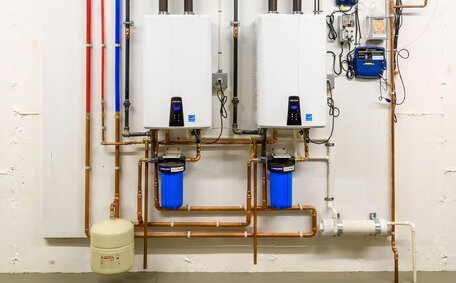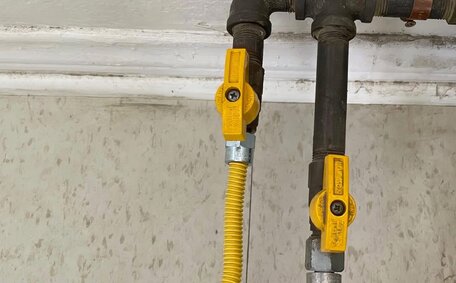
How Hard Water Hurts Hot Water Heaters
Hard water leaves mineral deposits in heaters, pipes and tanks. This limescale reduces efficiency, lifespan and hot water availability. Contact us for affordable water softening solutions.
Read MoreGas hot water heaters might fail due to various reasons, such as:
Since natural gas and electric gas water systems contain many interconnected parts responsible for heating water, any issues with gas delivery, combustion, valves, controls, or venting can disrupt your hot water supply.
Follow these steps to diagnose and fix water heater problems with your pilot light and burner in your water heater’s gas system:
If troubleshooting doesn’t resolve pilot light or burner issues, and you’re left without hot water, it’s wise to contact professional plumbers for an assessment of your water system.
Gas valves and thermocouples, which water heaters use as critical components, work in tandem to control the gas flow and pilot ignition in a water heater, ensuring the unit efficiently heats up when needed, Ensuring no hot water your household relies on is always readily available. When these parts malfunction, it can lead to a variety of problems such as the pilot light repeatedly going out, or the burner on the water heater might suddenly fail.
The gas valve opens to allow gas to flow to the burner when the pilot light is activated and the water heater thermostat calls for heat. Upon ignition of the pilot, as it heats the thermocouple, a small electrical signal prompts the gas valve to remain open, ensuring effective gas supply. If the pilot goes out, the thermocouple reacts to the temperature drop by safely closing the gas valve.
The thermocouple is a heat-sensitive device which plays a critical role when the pilot light is active.
A gas valve that fails to open properly could indicate a malfunction that requires attention, particularly when you need heating. To avoid disruptions in hot water heating, troubleshoot potential gas valve issues as follows:
A faulty thermocouple may lead to repeated pilot light outages. To investigate potential thermocouple issues:
Prevent gas-related issues including carbon monoxide hazards: If you detect the scent of gas when troubleshooting, which could hint at a gas leak, immediately switch off gas supply and seek a professional’s aid.
The heating element within a gas water heater tank is engineered to efficiently warm incoming water, maintaining steady water supply. It works together with the pilot light and burner to ensure adequate hot water supply.
A failing or burnt-out heating element, which can caused by a power surge tripping the circuit breaker, may result in issues such as:
To scrutinise a heating component, ensure you’ve precisely followed these steps to see your heating element checked:
If the heating element is defective, consider replacing it to ensure continuous functionality. Frequent cycling on and off can lead to early wear. Adjust the thermostat to 120°F (50°C) if you’re not using much hot water, to optimise efficiency.
Identifying water heater issues such as leaks, rust, or insufficiently sized tanks is critical to avoiding severe failures or water damage. Be alert for common water heater concerns, such as surprising instances of cold water:
Inspect around your tank, pipes, valves, fittings, and connections for any drips or moisture. Catching small leaks now prevents bigger issues later. Rust stains may also indicate tiny leaks.
While some surface rust is normal, excessive corrosion can lead to leaks, bad tasting water, and even pinhole heater tank failures. Drain and flush the tank annually to control sediment and rust, which can also enhance system efficiency. Install an in-line filter on your water tank if rust particles persist.
Electric hot water storage tanks, with a typical lifespan of 10-15 years, may ultimately corrode and leak despite regular maintenance. If you’re pondering 'do I have a tank failure?' due to its age, evident leakage, or other signs, promptly shut down your gas electric supply and water lines. Plan for professional replacement to prevent flood risks.
After exhaustive troubleshooting of your gas or electric water heater, if you still face hot water issues, it’s advisable to consult a local professional.
The following hot water system issues usually necessitate professional expertise and equipment:
For precise diagnosis and proficient repairs ensuring that your appliance consistently keeps the water flowing warmly in your abode, get in touch with our team at Picnic Point Plumbing.
Our team of licenced technicians can accurately diagnose issues and restore your hot water flow swiftly.Reach out by phone on 1300 349 338, email us at jobs@picnicpointplumbingservices.com.au, or book an appointment with your to schedule an inspection.
Regular maintenance helps both traditional and tankless water heaters deliver reliable hot water over a prolonged period. To extend the lifespan of your water heater, consider these proactive maintenance tips:
An annual inspection by a qualified technician can help catch minor problems with water systems before they escalate. Contact us today at Picnic Point Plumbing for proficient maintenance or repairs, upholding the safe and efficient operation of your water heater.
Hard water leaves mineral deposits in heaters, pipes and tanks. This limescale reduces efficiency, lifespan and hot water availability. Contact us for affordable water softening solutions.
Read MoreIt’s important to routinely check your gas appliances for any issues. Signs of problems include gas leaks, strange sounds, odd smells and more. Have a professional inspect your gas appliances annually and service them regularly for safety.
Read MoreUpgrading your gas meter is a simple process completed by registered technicians. It involves disconnecting your gas supply for 15 minutes to swap the old meter for a new digital smart meter. The upgrade is free and improves accuracy.
Read MorePicnic Point, 2213 NSW
We will call back as soon as possible.




